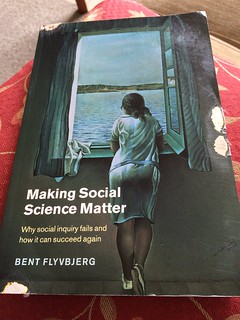 I have long admired Professor Bent Flyvbjerg for being an economic geographer who speaks methodologically and conceptually to many other disciplines. As someone who has been trained both in political science and human geography (with a concentration in economic geography), and who works in public administration/public management/public policy as well as comparative politics and international relations, the kind of interdisciplinary writing and thinking that Flyvbjerg is capable of doing is quite admirable and something I aspire to replicate in my own work. Having read (and used with my students and research assistants) his “5 misunderstandings regarding case studies” piece, I was very excited to read “Making Social Science Matter”. I am definitely not disappointed.
I have long admired Professor Bent Flyvbjerg for being an economic geographer who speaks methodologically and conceptually to many other disciplines. As someone who has been trained both in political science and human geography (with a concentration in economic geography), and who works in public administration/public management/public policy as well as comparative politics and international relations, the kind of interdisciplinary writing and thinking that Flyvbjerg is capable of doing is quite admirable and something I aspire to replicate in my own work. Having read (and used with my students and research assistants) his “5 misunderstandings regarding case studies” piece, I was very excited to read “Making Social Science Matter”. I am definitely not disappointed.
Bent Flyvbjerg uses the first 5 chapters do discuss empiricism, methodological debates, epistemology.
… a deep discussion of philosophy and sociology of science. Very useful for those doing STS.
Then in chapter 6 Flyvbjerg delves back into his 5 misunderstandings piece to show us about case study research and sampling strategies (an area that’s challenging for everyone) pic.twitter.com/m23lBdLLr3
— Dr Raul Pacheco-Vega (@raulpacheco) January 12, 2020
Chapters 7 and 8 delve into rationality and power, Aristotle, Foucault and Habermas. This analysis is important because conflict and power are at the core of what we understand as “the political” (see my paper on the politics of bottled water, Pacheco-Vega 2019, Langdon Winner on whether artifacts have politics, Winner 1980, Mark Warren on “what is political”, Warren 1999).
As an Ostrom scholar who often hears from non-Ostromians about “how Lin forgot to discuss power in her work on institutional analysis” (TL:DR; she didn’t), I often find discussions of power and Foucault rather enlightening. Flyvbjerg does excellent job of bringing them together.
Chapter 10 uses Flyvbjerg’s own work to illustrate how phronetic (more applied) research should operate. Finally, Chapter 11 will resonate with @StacyDVanDeveer and Paul Steinberg’s book, my own work on doubly engaged ethnography with @KateParizeau & anybody reading Theda Skocpol
— Dr Raul Pacheco-Vega (@raulpacheco) January 12, 2020
Flyvbjerg basically says “let’s do social science that matters”, something I can definitely agree with. A word of caution: this is NOT a book for undergraduates and I wouldn’t even assign it in first or second year of graduate school. This is a book for advanced graduate students with some experience already doing research and for experienced scholars.
Disclosure: As with most of my books, I purchased this book with my own money and I have no financial (or other) obligations to anyone for writing about it. I just like this book and that’s why I am writing about it.

0 Responses
Stay in touch with the conversation, subscribe to the RSS feed for comments on this post.